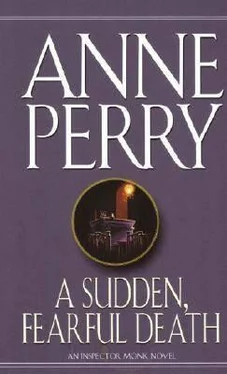"But you can think of no particular occasion on which she may have misinterpreted a specific remark? It would be most helpful if we could rebut it in more than general terms."
"I realize that, but I am afraid I can think of nothing I have ever said or done to make any woman think my interest was more than professional." Sir Herbert looked at him with anxiety and, Rathbone judged, a totally innocent confusion.
Rathbone rose to his feet.
"That is sufficient for this visit, Sir Herbert. Keep your spirits up. We have some time yet in which to learn more of Miss Barrymore and her other possible enemies and rivals. But please continue to cast your mind back over all the times you worked together recently and see if anything comes to you which may be of use. When we get to court, we must have more than a general denial." He smiled. "But try not to worry overmuch. I have excellent people who can assist me, and we will no doubt discover a great deal more before then."
Sir Herbert rose also. He was pale and the marks of anxiety were plain in his face now that he had stopped concentrating on specific questions. The gravity of his situation overwhelmed him, arid for all the force of logic and Rathbone's assurances, if the verdict was against him, he faced the rope, and the reality of that crowded out everything else.
He made as if to speak, and then found no words.
Rathbone had stood in cells like this more times than he could count, with all manner of both men and women, each facing the fear in their own way. Some were openly terrified, others masked their feelings with pride or anger. Sir Herbert was outwardly calm, but Rathbone knew the sick anxiety he must feel inside, and was helpless to do anything to help. Whatever he said, as soon as he was gone and the great door closed behind him, Sir Herbert would be alone for the long dragging hours, to swing from hope to despair, courage to terror. He must wait, and leave the battle to someone else.
"I will put my best people onto it," Rathbone said aloud, gripping Sir Herbert's hand in his own. "In the meantime, try to think over any conversation with Miss Barrymore that you can. It will be helpful to us to refute the interpretation they have put upon your regard for her."
"Yes." Sir Herbert composed his face into an expression of calm intelligence. "Of course. Good day, Mr. Rathbone. I shall look forward to your next visit…".
"In two or three days' time," Rathbone said in answer to the unasked question, then he turned to the door and called for the jailer.
* * * * *
Rathbone had every intention of doing all he could to find another suspect in the case. If Sir Herbert were innocent, then someone else was guilty. There was no one in London better able to unearth the truth than Monk. Accordingly he sent a letter to Monk's lodgings in Fitzroy Street, stating his intention to call upon him that evening on a matter of business. It never occurred to him that Monk might be otherwise engaged.
And indeed Monk was not. Whatever his personal inclinations, he needed every individual job, and he needed Rathbone's goodwill in general. Many of his most rewarding cases, both professionally and financially, came through Rathbone.
He welcomed him in and invited him to be seated in the comfortable chair, himself sitting in the one opposite and regarding him curiously. There had been nothing in his letter as to the nature of the present case.
Rathbone pursed his lips.
"I have an extremely difficult defense to conduct," he began carefully, watching Monk's face. "I am assuming my client is innocent The circumstantial evidence is poor, but the evidence of motive is strong, and no other immediate suspect leaps to mind."
"Any others possible?" Monk interrupted.
"Oh indeed, several."
"With motive?"
Rathbone settled a little more comfortably in his seat.
"Certainly, although there was no proof that it is powerful enough to have precipitated the act. One may deduce it rather than observe evidence of it."
"A nice distinction." Monk smiled. "I presume your client's motive is rather more evident?"
"I'm afraid so. But he is by no means the only suspect, merely by some way the best."
Monk looked thoughtful. "He denies the act. Does he deny the motive?"
"He does. He claims that the perception of it is a misunderstanding, not intentional, merely somewhat… emotionally distorted." He saw Monk's gray eyes narrow. Rathbone smiled. "I perceive your thoughts. You are correct. It is Sir Herbert Stanhope. I am quite aware that it was you who found the letters from Prudence Barrymore to her sister."
Monk's eyebrows rose.
"And yet you ask me to help you disprove their content?"
"Not disprove their content," Rathbone argued. "Simply show that Miss Barrymore's infatuation with Sir Herbert did not mean that he killed her. There are very credible other possibilities, one of which may prove to be the truth."
"And you are content with the possibility?" Monk asked. "Or do you wish me to provide proof of the alternative as well?"
"Possibility first," Rathbone said dryly. "Then when you have that, of course an alternative would be excellent. It is hardly satisfactory simply to establish doubt. It is not certain a jury will acquit on it, and it assuredly will not save the man's reputation. Without the conviction of someone else, he will effectively be ruined."
"Do you believe him innocent?" Monk looked at Rathbone with acute interest. "Or is that something you cannot tell me?"
"Yes I do," Rathbone answered candidly. "I have no grounds for it, but I do. Are you convinced of his guilt?"
"No," Monk replied with little hesitation. "I rather think not, in spite of the letters." His face darkened as he spoke. "It seems she was infatuated with him, and he may have been flattered and foolish enough to encourage her. But on reflection-I have given it a great deal of thought-murder seems a somewhat hysterical reaction to a young woman's emotions, no doubt embarrassing but not dangerous to him. Even if she was intensely in love with him," he said the words as though they were distasteful to him, "there was nothing she could do that would do more than cause him a certain awkwardness." He seemed to retreat inside himself and Rathbone was aware that the thoughts hurt him. "I would have thought a man of his eminence, working very often with women," he continued, "must have faced similar situations before. I do not share your certainty of his innocence, but I am sure there is more to the story than we have discovered so far. I accept your offer. I shall be most interested to see what else I can learn."
"Why were you involved in it in the first place?" Rathbone asked curiously.
"Lady Callandra wished the matter looked into. She is on the Board of Governors of the hospital and had a high regard for Prudence Barrymore."
"And this answer satisfies her?" Rathbone did not conceal his surprise. "I would have thought as a governor of the hospital she would have been most eager to vindicate Sir Herbert! He is unquestionably their brightest luminary; almost anyone could be better spared than he."
A flicker of doubt darkened Monk's eyes.
"Yes," he said slowly. "She does seem to be well satisfied. She has thanked me, paid me, and released me from the case."
Rathbone said nothing, his mind filled with conjecture, conclusionless, one thought melting into another, but worrying.
"Hester does not believe it is the answer," Monk continued after a moment or two.
Rathbone's attention was jerked back by the sound of her name. "Hester? What has she to do with it?"
Monk smiled with a downturn of the corners of his mouth. He regarded Rathbone with amusement, and Rathbone had the most uncomfortable sensation that his uneasy and very personal feelings for Hester were transparent in his face. Surely she would have had confided in Monk? That would be too-no, of course she would not. He dismissed the thought. It was disturbing and offensive.
Читать дальше












